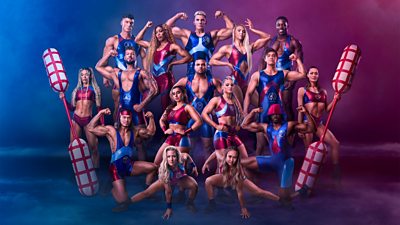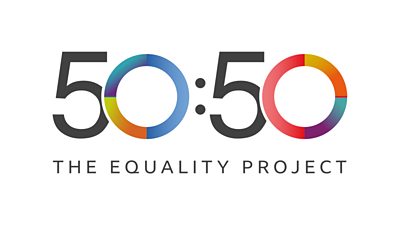What are the commitments?
For all new commissions after April 2021, we are asking our indie suppliers to commit to at least 20% of their production teams being from the following under-represented groups:
- Those from Black, Asian or minority ethnic (B.A.M.E.) backgrounds
- Those with lived experience of a disability
- Those from lower-income backgrounds i.e. social economic diversity (SED)
When did the commitments come into effect?
The commitments came into effect on 1 April 2021. It applies to all new commissions and underpins our previous commitments as set out in our ����ý Commissioning Diversity Code of Practice.
What is covered in the 20% target?
For the 20% target, we are focusing on priority areas of under-representation in the production sector. Our focus is on ethnicity, disability and socio-economic diversity. The targets are designed to be stretching but achievable across a range of genres, locations, scale of productions and size of production companies.
We are asking teams to ensure 20% of their production team is made up of at least two of these characteristics. We want to give flexibility in how they are applied to reflect various locations, content, and company characteristics.
Commissioners will have conversations with producers ahead of a programme being commissioned to discuss how they plan to achieve this target in the diversity conversation captured as part of the Ed Spec commissioning specification.
On individual productions the commissioner and producer may agree to target specific roles where they want to develop a broader talent pool in that area. Ideally, we would like to see a range of diversity across all levels of seniority, but we appreciate that not all productions will be able to achieve this straight away, so we will have discussions on a programme-by-programme basis.
We will monitor progress through .
What is ‘off-screen’ diversity?
Off-screen representation includes anyone who is working on your production. We are keen to have visibility of those who are working on our commissions.
From our data analysis we are aware that there are certain roles that we would like production teams to be more representative of our audiences, these roles include:
- Director, producer/Director
- Producer, Series Producer, Executive Producer, Line Producer
- Writer, Script editor
- Director of Photography
- Editor
- Head of Production, Production Manager
- Crews including 3rd party crew hire.
This is not an exhaustive list, and we would encourage our productions to be reflective across all roles.
What are the definitions for the three underrepresented groups?
The definitions for the three under-represented groups are as follows:
Those from Black, Asian or minority ethnic (B.A.M.E.) backgrounds
Defined as:
- Black/African/Caribbean/Black British. Selection: Black African, Black British, Black Other, Black Caribbean, Other Black background
- Asian/Asian British. Selection: Asian British, Bangladeshi, Chinese, Indian, Other Asian background, Pakistani
- Mixed/Multiple Ethnic Groups. Selection: Mixed Ethnicity
- Other Ethnic Group. Selection: Middle/Near Eastern/Arab, any other Ethnic Group
Those with lived experience of a disability
Defined as:
Under the Equality Act 2010 a person is disabled if they have a physical or mental impairment that has a ‘substantial’ and ‘long-term’ negative effect on their ability to do normal daily activities.
Those from lower-income backgrounds – to achieve social economic diversity (SED)
We use ‘parental occupation’ as the key factor to determine this group i.e. anyone whose parents were in ‘routine and manual occupations’ at the age of 14. For example:
- Semi-routine manual and service occupations such as: postal worker, machine operative, security guard, caretaker, farm worker, catering assistant, sales assistant.
- Routine manual and service occupations such as: HGV driver, cleaner, porter, packer, labourer, waiter/waitress, bar staff.
- Never worked, long term unemployed
We appreciate that social economic diversity is not as established an industry standard as ethnicity and disability – and we are working with other Broadcasters, The Creative Diversity Network and PACT to improve the consistency of definitions, monitoring protocols and reporting through Diamond. In the meantime, we will work with producers to make positive progress, and you can find useful resources to help in the sections below.
Why does the 20% target exclude Age, Gender and LGBTQ+?
Our overall data analysis indicates that across Age, Gender and LGBTQ+ we have a better representation compared to socioeconomic diversity, ethnicity and disability.
We are aware that in certain craft roles and within senior positions there is an underrepresentation of transgender, bisexuality and gender. Intersectionality can be applied to ensure we are not excluding ethnicity, disability and SED when hiring LGBTQ+ or by age or gender.
How much lead time will be given on a commission to ensure we have adequate time to recruit and make decisions?
Due to the nature of commissioning, we cannot always guarantee that we won’t green-light commissions at short notice. We encourage indies/suppliers to work with our commissioners early in the pitching process to talk about how the diversity requirements will be achieved and what support is needed from the ����ý.
We would encourage indies to work with the Creative Diversity team to deepen their talent pool and utilise down time between productions to connect with diverse talent, through activity such as networking events, connecting with organisations who cultivate talent and using social media platforms to identify talent.
Do interns, office and production runners count towards the 20%?
Yes, but only if they are working directly on the production and have a production credit.
We’re asking our suppliers to focus, as much as possible, on mid/senior level roles along with craft roles where there is a lack of representation across productions.
We actively encourage our suppliers to develop and progress entry level talent to ensure our productions have a diverse range of talent working on our shows.
How can Indies hire in a fair and transparent way?
Fair and transparent hiring practices have always been expected from indies working on a commission for the ����ý.
The Creative Diversity team will be implementing a series of support packages and resources to enable suppliers to recruit in a fair and transparent way.
Our partnership with enables us to also offer practical advice and guidance to the indie sector along with training tools which are available.
Where can we advertise to get more diverse people/talent to apply?
There are a number or platforms in which you can make your opportunities more visible to diverse talent, ensuring that most, if not all your roles are advertised will help to attract a diverse range of applicants applying.
On the Creative Diversity website, we have a resources tab that features a list of organisations in which you may wish to advertise. Please be mindful that some organisations may choose to charge for their services.
Can we ask an individual if they are ethnically diverse or have a disability, during an interview?
No. It is unlawful to ask candidates about their diverse background, but it is acceptable to establish if they have any adjustment needs/requirements.
You cannot ask an individual if they have a disability during the interview process, this extends to asking someone about their ethnicity as these are protected characteristics.
How do I know if someone identifies as SED?
It is not against the law to ask about whether someone regards themselves to be from an SED background but it not good practice to do so. We do encourage suppliers to recruit from a wide range of networks and advertise their roles broadly and mitigate against biases from the selection process.
To ensure you have a higher percentage of candidates from underrepresented groups applying to your vacancies we’d advise you taking the following steps:
- Advertise your roles as widely as possible,
- Diversify your network groups and contacts.
- Connect with organisations who developing and cultivating diverse talent.
- Host insights and networking events.
Indies may wish to introduce equal opportunity forms to capture diverse information of their teams. If this approach is adopted, there are certain requirements that need to be considered:
- GDPR
- Clear messaging to the individual regarding the intended use of the data,
- Where the information will be stored and how this info will be used
- Who will access to this data,
These are some of the considerations that need to be factored in prior to implementing this approach and we would advise seeking legal counsel before embarking on this.
Across the UK, certain areas may be more challenging what advice is available?
We recognise the challenges some suppliers/indies may face due to geographical representation within the nations, that is why there is flexibility in meeting 20% diversity. Suppliers are required to meet two out of the three aspects of the diversity agenda: Disability, ethnicity and socio economic.
If an indie supplier sub-contracts an element of production to a different production house – i.e. sub-contracts the animation elements of a mixed media production to an animation agency – do the diverse staff that work on the content within the sub-contracted agency count towards the targets?
Yes; in the same way that hiring a head of sound who brings a team with them means that their team counts towards the overall diversity of a project. Please note that it is only staff who work directly on the project who count and not the workforce generally across the sub-contracted agency.
What support is available?
The Creative Diversity team will work closely with our suppliers to provide advice and guidance in meeting our new diversity targets. Creative Diversity Lead’s: Iyare Igiehon and Michelle Matherson look after scripted and unscripted content, respectively and our Creative Diversity Partner Kay Ashton leads on disability.
You can meet the team on the , and there is additional information on ����ý Commissioning website.
What funding is available for programme makers?
Within commissioning we have two specific funds that are dedicated to support our suppliers and help drive change across the diversity and inclusion agenda.
The Diversity and Inclusion fund can be used to support our programme makers to develop talent that is reflective of modern Britain and our diverse audiences.
We also have the Small Indie fund designed to support indies with less than a £10m annual turnover. We have ring-fenced £2m of development spend in this Small Indie Fund to support small and emerging companies. Small Indie Fund
How will the ����ý monitor progress?
We are committed to monitoring and measuring diverse onscreen representation across our TV output and have established processes in place to report on our progress. This information can be obtained in our Annual Reports and Accounts.
Using Diamond (the industry standard diversity monitoring tool), we can get a better understanding of the diversity and inclusion landscape across productions.
For Diamond data to be truly impactful it needs everyone involved in making our shows to contribute – whether on or off screen – so we can hold a mirror up to ourselves and see if we are achieving our goals. Where we are, we can build on what has worked, and where we are not, we can target time and resources to drive change.
Diamond diversity forms are completed via the production reporting system - .
How does Diamond accurately reflect a production if people are not obliged to self-declare?
We actively encourage indies/suppliers to work with their crew to provide diamond data. While we cannot make participation mandatory this is the way in which we will evidence a production’s ability to meet the 20% target.
What is the consequence to not meeting the 20% target?
We expect productions to establish practical solutions to overcoming challenges and have a long-term view of inclusive recruitment opportunities. Our approach to producers missing the target will be considered on a case-by-case basis depending on the company, production, location, scale, and repetition of any discrepancy.
Productions who failed to advise us of significant changes, will be flagged to the commissioner ahead of any new or re-commissions to establish what interventions will be put in place to ensure greater success. Repeat offenders will be dealt on a case-by-case basis and the ����ý reserves the right not to commission from the indie should they continue to fail to meet our targets.
For further information please check out the ����ý Commissioning website.
Discover more
-

Code of Practice Progress Report 2023/24
An update of progress on the ����ý Creative Diversity Commitment -

Elevate
Supporting deaf, disabled and neurodivergent talent in the TV industry. -

Reflecting our world
Inspiring organisations around the globe to create content that fairly represents our society.


